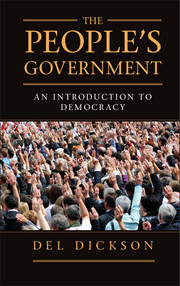Book contents
- Frontmatter
- Contents
- Acknowledgments
- Prologue
- 1 Liberty and Freedom
- 2 Freedom or Liberty?
- 3 Rights
- 4 Participation and Representation
- 5 Inclusion
- 6 Equality
- 7 Power
- 8 The Case against Democracy
- 9 The Case for Democracy
- 10 Building a Stable Democracy
- 11 Three Misconceptions about Democratization
- 12 How Democracies Die
- 13 How Democratic Is the United States?
- Glossary and Biographies
- Bibliography
- Index
- References
11 - Three Misconceptions about Democratization
Published online by Cambridge University Press: 05 August 2014
- Frontmatter
- Contents
- Acknowledgments
- Prologue
- 1 Liberty and Freedom
- 2 Freedom or Liberty?
- 3 Rights
- 4 Participation and Representation
- 5 Inclusion
- 6 Equality
- 7 Power
- 8 The Case against Democracy
- 9 The Case for Democracy
- 10 Building a Stable Democracy
- 11 Three Misconceptions about Democratization
- 12 How Democracies Die
- 13 How Democratic Is the United States?
- Glossary and Biographies
- Bibliography
- Index
- References
Summary
Political scientists are at our best explaining why what just happened was inevitable. We are less good at ex ante predictions, so most of us quickly learn to make vague oracular prophecies that will seem to come true no matter what.
In his article Will Countries Become More Democratic? Samuel Huntington was characteristically bolder than most. First, he asked an important question that still begs to be answered: which developing countries are most – or least – likely to democratize? He proved his place in the discipline’s pantheon yet again, by proposing detailed predictive criteria and specifying which states were the best and worst bets. With the benefit of hindsight, Huntington’s predictions proved to be hit or miss, but he went down swinging.
Here we briefly examine three common, but erroneous, claims that Huntington and other leading political scientists make about democratization.
CLAIM #1: POOR COUNTRIES WILL NOT BECOME DEMOCRATIC
Can poor countries become democratic? Two giants of political science, Huntington and Hannah Arendt, say no.
Arendt argued that democracy is a beautiful choice limited to relatively wealthy societies. Self-government requires surplus resources to support democratic institutions and processes. Poor countries, where people struggle to survive, cannot afford such luxury.
Huntington cited simple but compelling data to support his claim that poor countries will not become democratic. He found that only two of thirty-six low-income countries were democratic, and eighteen of twenty-four advanced industrial countries were stable democracies. Huntington hypothesized that states must first reach a certain level of economic prosperity, which he called the transition zone, before democracy becomes a realistic possibility.
- Type
- Chapter
- Information
- The People's GovernmentAn Introduction to Democracy, pp. 193 - 202Publisher: Cambridge University PressPrint publication year: 2014



